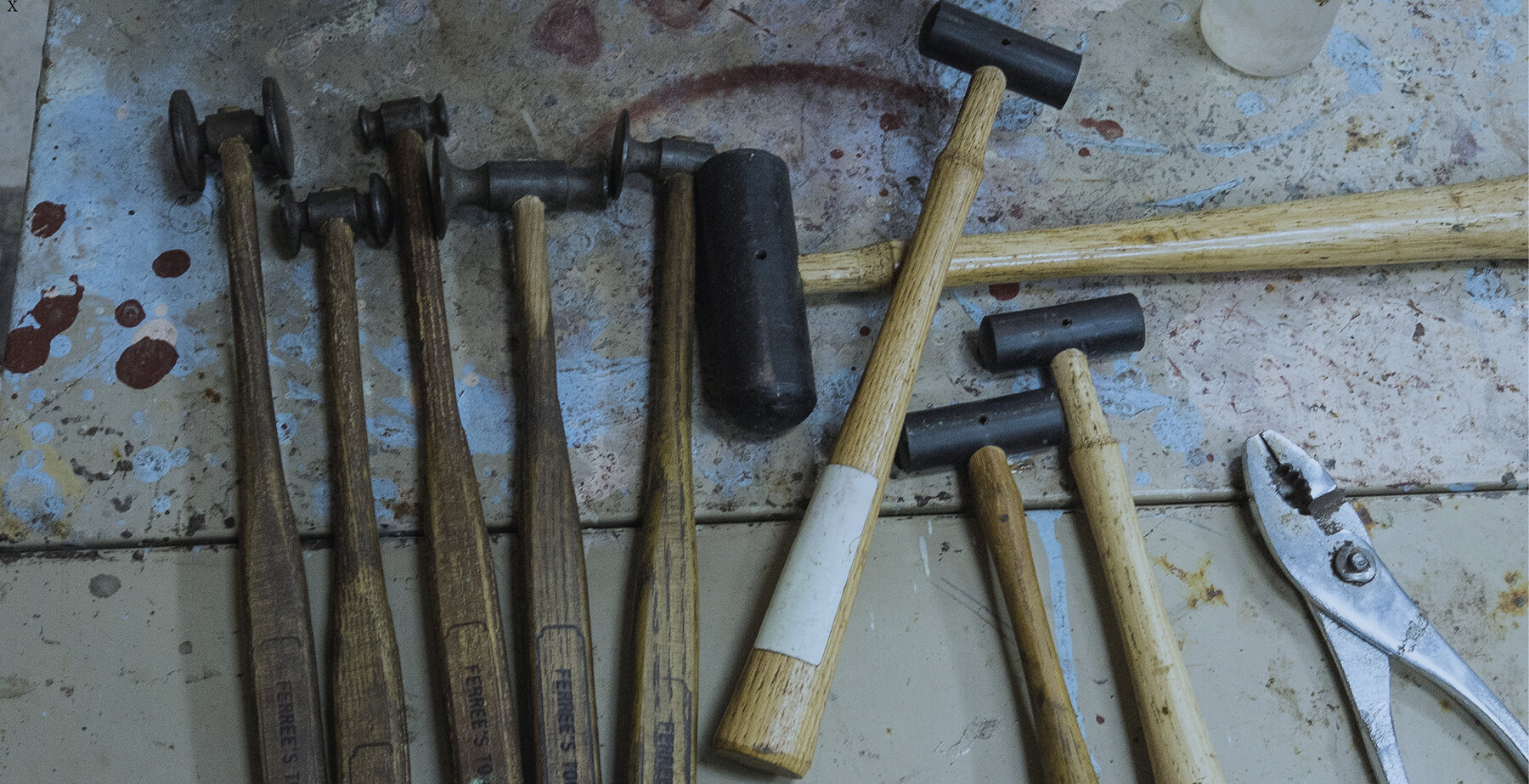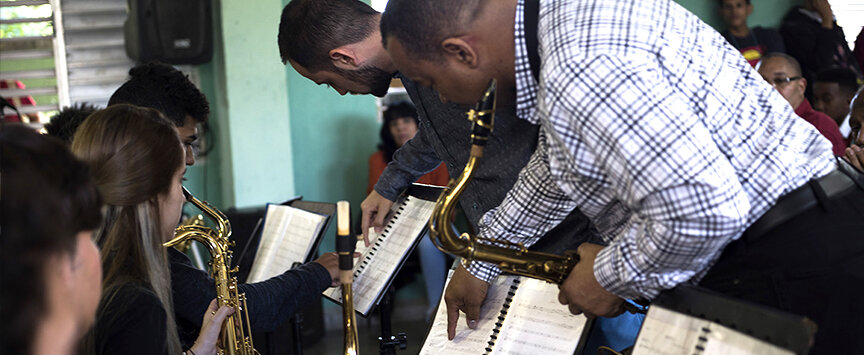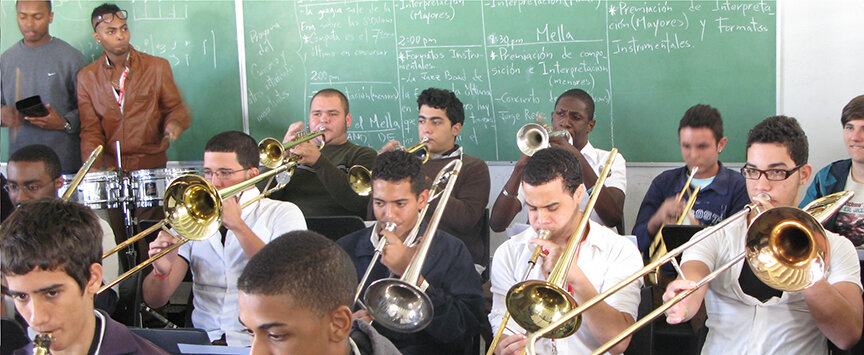
PROGRAMS

MUSIC EDUCATION
While Cuba has a rich history of jazz, there is a dearth of resources to formally study the form. Our education programs provide expert instruction, new pedagogies and methods that are integrated into student training and curriculum by local instructors. Our education advisors Victor Goines, Yosvany Terry and Chad Eby are world-renowned musicians and teaching faculty at Northwestern University, Harvard University and University of North Carolina at Greensboro. We produce annual music and cultural exchange residencies we call Jazz Amistad residencies. We recruit volunteer U.S. jazz musicians and partners such as Jazz at Lincoln Center, Preservation Hall Foundation and Trombone Shorty Foundation to teach the residencies which include:
Teacher’s workshops to address the needs of the local music educator;
Student sectional workshops (by instrument);
Student ensemble workshops; and
Performances by our faculty and student performers
BRINGING THE SPIRIT OF JAZZ TO MUSIC STUDENTS
CULTURAL EXCHANGE
Our Jazz Amistad residencies go beyond music education to include cultural “intercambio” or exchange. Exchanges happen in Cuba and the U.S. and are designed to:
Increase musical knowledge and technical capacity;
Broaden perspectives of educators;
Spark cultural partnerships and learning; and
Inspire students personally and professionally.
We view jazz as a global language and as a shared bridge between Cuba and the U.S., because music transcends boundaries of geography, politics, culture, language and even time. Life-changing for students and professors on both sides, Jazz Amistads provide opportunities to preserve musical legacies and to encourage young musicians to innovate and create their own musical futures. Ultimately Jazz Amistads are not just about musical technique –they are about instilling the improvisational and collaborative spirit of jazz.
STRENGTHENING TIES BETWEEN COUNTRIES USING SHARED MUSICAL TRADITIONS

INSTRUMENT REPAIR + TRAINING
A proper instrument in good working condition is essential to a musician. In Cuba, many issues affect instrument quality and access: weather damage; multiple and long-term usage; affordability and availability issues; and more. This situation impedes the educational and professional opportunities of students. In 2010 we recruited the renowned instrument artisan David Gage of New York City’s David Gage String Instrument Repair and with Judy Epstein Gage, formed the Instrument Artisans Council, a group of volunteer instrument artisans who oversee annual visits to the island for repair and training work. Families, students, music professors and other music professionals come to our workshop from throughout the island. We have now trained local artisans and have made over 7000 instrument repairs. CNEART, The Ministry of Culture’s arts school administration, donated the building for the permanent repair shop and hired six Cuban repair technicians (partially trained by our master artisans) to fix instruments for students in Cuba’s music schools.
FULFILLING DREAMS OF ASPIRING YOUNG MUSICIANS
INSTRUMENT DONATION
Many students do not own their own instrument. They are only able to play on instruments loaned by their schools so they can perform in class. The quality of these instruments varies and often students must share instruments.
They also must return these instruments once they finish their studies. For young musicians, owning an instrument often makes the difference between pursuing music as a career after graduation or not. Horns to Havana works to address this need by working with our local partners to identify students in need of instruments and to match them with donated instruments. Thanks to the generous donations of high quality used and new instruments by our supporters across the U.S., we have been able to provide a multitude of instruments to music students. We continue to find new partners like Trombone Shorty Foundation to assist in bringing instruments and parts to individuals in Cuba. These instruments are changing lives, and we are grateful!
JAZZ DIGS INTO OUR COMMON PAST AND REMOVES POLITICS FROM THE DISCUSSION

PARTNER MUSIC SCHOOLS IN HAVANA
Horns to Havana partners with CNEART, the Centro Nacional de Escuelas de Artes (National Center for Arts Schools), which administers programs in Havana’s music schools. Over the years, we have developed relationships with a number of music schools in Havana and the surrounding area.
Overview of the Cuban Musical Education System
The two main characteristics of the Cuban musical education system are that it is (1) exclusively based on the pupils’ musical talent and (2) that it is free. Getting into the system and receiving promotions to the next level occur through placement performance exams.
There are 20 elementary level schools in the 14 provinces (from 3rd to 9th grade) that teach academic curriculum and musical education in opposite sessions. There are 12 intermediate level provincial schools and conservatories that teach music and general academic subjects for four years concurrently. The final level for a student musician is learning at the University of Arts in Havana, which has branches in Santiago de Cuba and Camaguey.
Horns to Havana has contributed to intermediate level learning at schools in Havana since 2010. Highlights of this collaboration included presentations by young Cuban jazz bands in the United States, including performing at Jazz at Lincoln Center Dizzy’s Club Coca-Cola (2016) and Essentially Ellington Festival (2017, 2020) in New York City.
A particularly important contribution of Horns to Havana to Cuban musicians has been the luthier workshop, which was created to help young musicians receive instrument repair service and to serve as a needed luthier apprentice program.
Below are the schools we have been working with and some of their main characteristics.
CONSERVATORIO AMADEO ROLDÁN
The Amadeo Roldan Conservatory is Cuba’s premier academy of music. The school was founded in 1903 as “Dr. O’Farrill Music Academy.” The conservatory was renamed for the great composer/orchestra leader/musician Amadeo Roldan, who also was its former principal. The school has a jazz band whose musicians have successfully participated in many Horns to Havana events.
ESCUELA ELEMENTAL DE ARTE ALEJANDRO GARCIÁ CATURLA
Located in the Marianao neighborhood of Havana, the Alejandro Garcia Caturla Elementary Art School was built in 1961. It stands out for its architecture and the use of colored glass. It has specialized classrooms, a library, music booths, and a theater for 284 spectators
ESCUELA NACIONAL DE ARTE
The National School of Arts was founded in 1962. The music school was part of a wider project that included ballet, drama and visual art schools in order to promote the development of arts in Cuba's new society. ENA has become the premier national boarding school for students studying the arts. Horns to Havana has sponsored the ENA jazz band in the U.S. for performances, and its band has won several JoJazz band competitions in Havana.
ESCUELA ELEMENTAL DE MÚSICA MANUEL SAUMELL
The Manuel Saumell Music School is the oldest (before 1959) elementary music school in Havana. It is located in Vedado, in a quite atypical German Gothic building. It’s named after the 19th century pianist and visionary, Manuel Saumell, who was the first composer to introduce elements of Creole and Cuban music into his work. Musicians like Chucho Valdés, Argelia Fragoso, Gonzalo Rubalcaba, and Aldo Lopez Gavilan all began to learn their instruments here before continuing on to higher levels of education at Amadeo Roldán.
CONSERVATORIO GUILLERMO TOMÁS
Conservatorio Guillermo Tomás is located in Guanabacoa, a municipality in the outskirts of Havana. The conservatory was named after one of Cuba's most renowned band directors at the beginning of the 20th century and is unique in that it serves over 500 students at both elementary and intermediate levels. Students range in age from 8 to 19 and study music and all academic subjects. Located in a once marginalized area of the city, the school is known for the high quality of teaching and its graduation success.
The National School of Arts was founded in 1962. The music school was part of a wider project that included ballet, drama and visual art schools in order to promote the development of arts in the new society. ENA became the premier national boarding school for students studying the arts. The ENA jazz band has been supported by Horns to Havana to play in the U.S. and has won several JoJazz competitions.
ESCUELA ELEMENTAL DE ARTE PAULITA CONCEPCIÓN
The Paulita Concepción Elementary School is an elementary music academy located in the Cerro neighborhood of Havana. The school was founded in 1981 as a school for visual arts, but currently focuses on music.






